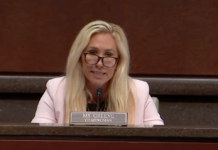
(Georgia Recorder) — An expansion to Georgia’s school voucher program is getting another shot this year after passing the House Education Committee on party lines Wednesday.
The latest form of the bill would allow parents to accept $6,500 to pull their children out of a public school with low-performance metrics and enroll them in private school or teach them at home. Expanding vouchers has been a dream of conservatives in Georgia for a while now, who say a free market approach benefits students who are not well served by their local public school district.
That conservative priority came close to becoming reality last year when a voucher plan passed the state Senate. Still, it failed when a handful of House Republicans joined nearly all Democrats in voting against it. Opponents say vouchers transfer money from school districts in need of more funding to private enterprises that are not accountable to public scrutiny. They also say that $6,500 does not cover tuition at reputable private schools, so the vouchers will only act as a discount to families that can already afford it.
“This does not empower parents at all to choose where their children go to school,” said Lisa Morgan, president of the Georgia Association of Educators. “It empowers private schools to make those choices. Private schools are not required in any sense to accept a student who has one of these vouchers. The private school still can discriminate on the basis of disability. The private school can still discriminate on any number of characteristics of the student. The parents are not empowered here. The private schools have a choice, and that’s what we need everyone to understand.”
The bill’s chances of becoming law appear higher this year with the support of the House’s highest-ranked member, Speaker Jon Burns, who made an appearance at Wednesday’s committee meeting to boost the bill.
Burns said Wednesday’s meeting was his first time at an Education Committee, and he made it clear he wants the bill to move forward.
“I would like for our House to send a clear signal that we will not let our children continue to be trapped in a failing school, that we’re taking a stand [to] give the parents of Georgia better options, and we are unlocking doors to the future for the children across this state,” he said.
“I hope when y ‘all’s discussion finishes, this committee will make a decision to move this bill forward,” he added.
Gov. Brian Kemp has also shown strong support for vouchers. On Tuesday, Kemp told reporters that he has been “patiently awaiting the House’s work” on the bill. The governor pressed lawmakers to pass a school voucher bill earlier this session in his State of the State address, saying, “I believe we have run out of ‘next years’” to get it done.
“It’s my hope that we’ll get that done this year, and yes, we will be aggressively pushing for that once we know what the House’s posture’s going to be,” Kemp said Tuesday.
Another top Republican, Speaker Pro Tem Jan Jones, presented the bill to the committee with many changes over last year’s.
The bill would make teacher pay raises approved over the past few years permanent. It would allow public schools to use state capital construction dollars to build or renovate Pre-K facilities.
It creates a new body called the Georgia Education Savings Authority to administer school voucher programs, and, similar to a bill that passed the Senate last month, it creates rules for students to transfer between public school districts.
It still applies to students zoned into the lowest-performing 25% of schools, but Jones said she added a provision giving priority to students whose parents earn less than 400% of the federal poverty line, or $120,000 a year for a family of four in 2024.
Jones also added a cap to the program of 1% of the cost of the Quality Basic Education formula used to determine the state’s school funding share, equaling more than $100 million. Education accounts for about a third of the state’s $30 billion-plus.
Speaking to the Recorder after the vote, Jones said she’s quite confident the House will pass the bill.
Why?
“20 years of vote counting,” she said with a laugh.
Republicans on the committee were effusive in their praise of the bill, including Atlanta Rep. Mesha Mainor, who switched parties last year after she faced heavy criticism for backing vouchers.
“I loved the bill last year; I love it now,” she said. “It meets the needs of so many different families.”
Democrats were more circumspect. Powder Springs Rep. David Wilkerson said they had little time to review the 39-page document.
“While the majority party, as the speaker alluded to, may have had 350 days actually to review this bill, we’ve had probably 35 minutes,” he said.
Democrats proposed two amendments: one to require private schools that receive state money to accept all candidates and one to require that all teachers in participating schools be professionally certified. The committee voted against the amendments on a party-line basis.
Voucher supporters say the plan would not harm public school budgets. That’s because schools get money both from the state and local taxes. Supporters say the $6,500 would cancel out the state share of funds, but schools would still collect local taxes for students who take advantage of the program.
Opponents say that doesn’t add up because schools would be out $6,500 for each student, but they can’t lower the salary of a teacher whose class size decreases, and fewer students doesn’t translate to less cost to heat or cool a building or transport children to and from the school.
A poll commissioned by the Georgia Budget and Policy Institute and University of Georgia School of Public and International Affairs Survey Research Center suggests Georgia voters and parents aren’t wild about vouchers.
Pollsters asked registered Georgia voters how the state should support students in underperforming schools, giving them the options to give parents $6,500 to pay for private school tuition, provide schools with more state support or increase choice options like dual enrollment or charter schools.
A plurality of voters, 43.7%, said schools should get more state support, 29.4% said more school choice options and 14.8% preferred the $6,500 vouchers.
Voucher support increased somewhat when pollsters asked respondents with school-aged children which policy would be best for their family. Among parents, 22.6% said $6,500 vouchers would be best for them, 39.8% said they wanted more state support, and 31% favored increased choice options.







